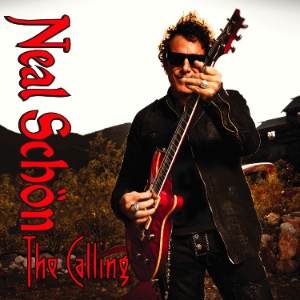Taking a break from his day-job as Journey’s lead guitarist, Neal Schon has set about recording ‘the calling’, an instrumental solo album that ranks up there with the recent remarkable efforts by Paul Gilbert and Steve Lukather in terms of power, feel and virtuosity. If, like me, you are wary of any instrumental guitar album then it is important to allay your fears from the start: ‘The Calling’ is no one-dimensional ego-trip for Neil; here every player is allowed the freedom and space to shine in their respective fields. More importantly ‘The calling’ just plain rocks, with each of its twelve tracks offering a distinct vibe that, whilst contributing to a cohesive whole, offer enough variety that the music never becomes boring or repetitive.
With Neal handling the guitar and bass duties himself it was important to get in experienced musicians to provide the finishing touches. For this Neal recruited former Journey drummer Steve Smith whose jazzy, deft performance is nothing less than astonishing throughout. The album’s tracks were further augmented with the addition of Igor Len, a composer who has worked on jazz, classical and film music over the course of his lengthy career, and it is Igor who provides the piano parts for the record. With Steve and Igor on board, Neal was able to complete the album and the result is a fiery mix of red-hot improve, blues attitude and jazzy time signatures that references everyone from Hendrix to Robert Fripp over the course of its fifty-four minute run-time. It is an exhilarating ride and one that even the most hardened cynics will find impossible to ignore.
Offering nothing in the way of build-up, Neal slams into the title track with giddy abandon, his guitar reduced to a pile of shredded wood and smouldering strings over a track that sets a blistering tone for what is to come. Steve’s drums ring out loud and clear while the riffs are a neat mixture of Black Country Communion, Led Zeppelin and Audioslave. It’s also surprisingly heavy, the tight groove laid down by Neal on the bass neatly underpinning the blazing solos and dynamic riffs – it’s an amazing start to the trip. ‘Carnival jazz’ utilises innovative percussion and melodic riffs to forge out a different path from its predecessor, Igor’s piano adding a delicious lightness to the close of the track. Changing tack again ‘six string waltz’ sounds like the epic conclusion to an action movie, the guitars building to a crescendo over a beautifully emotive melodic backdrop and this leads perfectly to the delicate, haunting ‘Irish Field’ which sees the guitars drenched in reverb and echo, trickling over each other like a softly-flowing stream. It is every bit as redolent of a pastoral scene as its creator imagines and sitting back, eyes closed, just letting the music wash over you is a genuine delight.
‘Irish field’ is, however, a short detour into the realms of blissful fantasy, and the pay-off is the hulking ‘back smash’ with its crushing bass lines, Led Zeppelin-worshipping riffs and devastating solos. Neal, in the liner notes, says he wanted this to be a vocal piece originally; we can only be glad that it did not turn out to be the case because ‘back smash’ is a scintillating instrumental that no amount of well-delivered vocals could improve, particularly when the orchestral mid-section turns out to be a stunning interlude that turns the listener’s perception of the song upon its head. ‘Fifty six’, with its eastern promise and electric sitar, is a track that is redolent of spice and red dirt, the melody swirling in the mid-day heat with only Igor’s cool-headed piano lines to keep the whole thing from melting into the sand. On a more bluesy tip, ‘true emotion’ (surely the album’s unofficial title so awash with feeling are the solos) is a track that sees Neal playing with a fluid grace that recalls the languid beauty of David Gilmour’s solo work. Heading back towards the funkier feel of the first track, ‘Tumbleweeds’ features Jan Hammer on Moog and has an eccentric lead that recalls Robert Fripp’s work on ‘Scary monsters’.
Described as ‘a great song for sports channels’ by Neal, ‘primal surge’ is exactly that, a furious clash of rhythm, taut, tension-building riffs and melody that builds towards its climax at a pace that is as tense as any match you may be watching. The tenth track is a particularly emotive one for rock fans as it is Neal’s personal tribute to Ronnie James Dio. Touching, heartfelt and beautiful, Neal’s guitar says more than any lyrics could hope to do and it’s a wonderful gesture. Having slowed the pace, it is up to ‘transonic funk’ to restore the groove, and it does so with ease, the trio of Steve, Igor and Neal riffing off of one another with an energy and enthusiasm that is infectious. Final song, ‘song of the wind II’ (inspired by ‘the song of the wind’ from the first Santana Caravanseri album) was recorded, apparently, in the final half hour of one of the sessions, although such temporal restrictions don’t show as the band once again recall the gentle beauty of David Gilmour’s ‘on an island’ record.
This is a fine record indeed that fires the imagination and enlivens the senses. Neal’s guitar work is, as you would expect, exemplary and the recording sonically perfect. There is a warmth to the mix that makes the record an absolute pleasure to listen to, and all the musicians involved are leaders in their respective fields. ‘The Calling’ is a beautiful, powerful, soulful record that will instantly appeal to fans of classic rock and blues and jazz – this is an excellent addition to any music fan’s collection.




